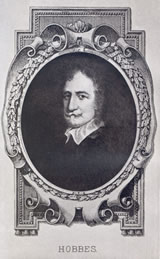
(April 5, 1588 – December 4, 1679)
English Philosopher
Portuguese Version
Influences
- Student of:
- Influenced by:
- Students:
- Influenced:
- Time Period: Historical Foundations
Education
- Magdalen Hall, Oxford University, 1608, B.A.
Career
- 1608, became tutor of William Cavendish, later Earl of Devonshire
- 1640, authored The Elements of Law, Nature & Politic, a defense of the monarchy, caused him to voluntarily exile himself to Paris for 11 years
- 1646-1648, math tutor to Prince of Wales, later King Charles II, who was also in exile in Paris
Ideas and Contributions
Thomas Hobbes was one of the first modern Western thinkers, the first in the line of British empiricists. He is also known for his English verse translations of Homer’s Iliad and Odyssey. His writing provided a secular explanation of the political state, and denoted the departure in English philosophy from Scholasticism with its religious emphasis. Hobbes believed that understanding the psychology of individuals was necessary before one could develop an understanding of the state and government. He believed that humans are fearful and predatory, and must submit completely to the supremacy of the state in both secular and religious concerns. Hobbes asserted that there is a difference between knowledge and faith, which resulted in charges of atheistic tendencies. He is considered the first modern social psychologist because of his emphasis on the relationship between the individual and society. (Microsoft Encarta)
Hobbes attempted to explain human motivation by applying mechanistic principles [a philosophy that attempts to explain the universe as mechanical processes or movement], thereby contributing to psychology and laying the foundations of sociology. He also stressed the role of experience as the source of human knowledge. He theorized that all human actions are based on material phenomena. Hobbes concluded that humans were stimulated by “appetite” or movement toward an object, similar to pleasure and “aversion” or movement away from an object, similar to pain. Hobbes’s doctrine that human behavior is directed by self-interest is now known as psychological hedonism.
Hobbes rejected supernaturalistic beliefs and utilized the materialistic explanation of mechanistic principles to explain all phenomena. He believed that the mental processes were the result of the motion of brain atoms activated by motions in the external world. He maintained that sensations lead to simple ideas, and simple ideas merge to form complex ones. Basically, all cognitions are transformed sensations. (Zusne)
Hobbes clearly stated the principle of association of ideas in terms of temporal sequences or “trains” of thought, “coherence” (i.e., contiguity) as a factor in association, habit and desire as guides of attention, repetition as a factor in association, and distinguishes between free and controlled association of ideas. . . . Hobbes stressed the motivational aspects of passions and desires, especially the desire for power. He mentions the fact that passions may distort reason, distinguishes between innate and acquired emotions, and even outlines a theory of humor and laughter. (Zusne, p. 240)
Publications
- Humaine Nature (1650)
- Leviathan orThe Matter, Form, and Power of a Commonwealth Ecclesiastical and Civil (1651)
- Behemoth: The History of the Causes of Civil Wars of England
- Dialogues Between a Philosopher and a Student of the Common Laws of England
- Historia Ecclesiastica
References: 15, 27, 29
Image reprinted from Robertson, G.C. (1886). Hobbes. London: William Blackwood & Sons
